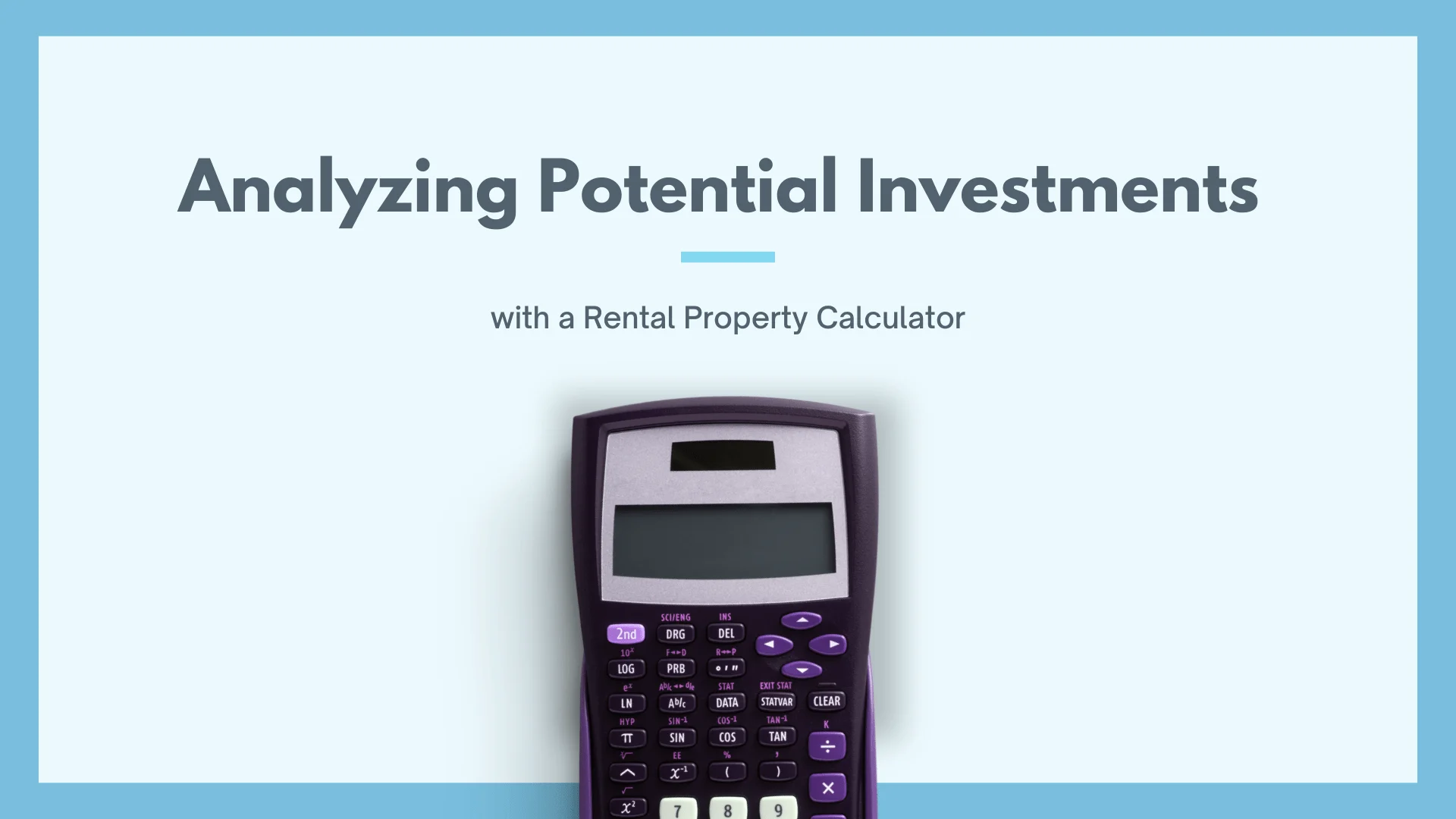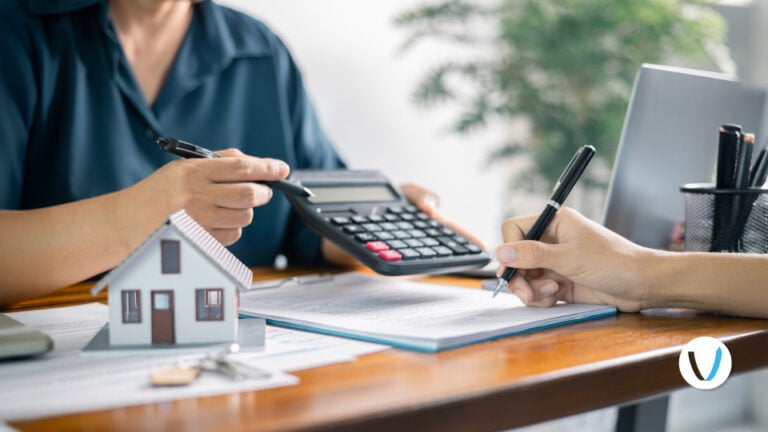This post has been updated in May 2024 for freshness and accuracy.
Real estate investing is a powerful strategy for securing your financial future. This lucrative method can improve and diversify your portfolio with passive income opportunities, profits from increased property values, and even some tax benefits, depending on the type of investments that you will tackle.
Our free rental property calculators will help you determine the numbers behind your next investment to make sure you are getting started on the right foot.
Jump to a calculator here:
Rental Property Investing
Within the realm of real estate investing is the specific focus on rental properties. There are many types of rental properties that you can add to your portfolio, including single-family homes, multi-family homes, condos, townhouses, apartment complexes, and more. Once you own the property, your ability to fill the homes, rooms, or units with tenants will determine how profitable this venture can be.
Earning Income from a Rental Property
What makes rental property investments so attractive is the potential income that can be earned from tenants. This is known as rental income. While it includes the cost of monthly rent from each tenant, other factors like laundry services or parking passes can also generate cash flow for the property, and therefore, the owner. Whilethe main focus of rental property investing is collecting rent, you can also turn a profit by making improvements to the property and eventually selling it once you have built some equity. The earning potential for rental properties is very high, and it can set you, your family, and the next generations up for financial stability for many years to come.
How a Rental Property Calculator Can Help
No investment strategy should be implemented without plenty of research and preparation, especially in the real estate sector. Many factors can affect the profitability of any type of property, and rental properties are no exception.
Before you decide to go all-in on this type of investment, you need to understand the various formulas and conditions that will determine the potential profits.
This is where a rental property calculator can come in.
This tool takes into account many factors that will affect how much money can be made from a particular property. It will provide you with an accurate picture of the total costs associated with purchasing the property, operating it, and the level of income that will be required to turn a profit.
What You’ll Need to Know
This article will give you a glimpse into the world of rental property investments and the kind of planning that is required for this strategy to work. You’ll learn what factors to look for when analyzing a potential rental property, such as location, rental type, expenses, market conditions, property condition, and financing options. We will also discuss some of the formulas and calculations that need to play a role in your planning, such as…
- Net Operating Income (NOI)
- Cash Flow
- Capitalization Rate
- Cash On Cash Returns
- Rental Yield
- Return On Investment (ROI)
Let’s dive into the details of calculations for rental investment properties and how this can help determine profitability.
What to Consider When Analyzing a Potential Rental Property
Research is the key to a successful investment venture. Before you add a specific asset to your portfolio, you need to analyze its potential for profits and whether or not it is worth the cost or the risk. If you want to become a rental property owner, here is what you should consider when searching for the right property.
Your Rental Strategy
Are you more interested in short-term rentals, like vacation homes and Airbnbs, or long-term rental properties, where tenants may stay for years? The two strategies require unique approaches, so make sure you know the difference between short-term and long-term rental properties.
Location
Location plays a vital role in rental investing. Consider population size, demographics, amenities, public transit, and local market fluctuations. For example, one place may be great for apartment complexes but bad for single-family homes.
Property Condition
If you are willing to invest money into repair costs or significant upgrades, the upfront costs will be higher, and you may not see returns for a while. A well-maintained property may have a higher purchase price, but you can start earning income from current or new tenants faster.
Rental Income
Calculating the potential income from rent is critical to analyzing a rental property. You’ll have to study the market to determine fair rental rates. Tenant acquisition and tenant retention will be key to keeping the vacancy rate low so that your units are filled with paying renters.
Expenses
The operating expenses associated with the property directly impact your passive income potential. These costs include utilities, maintenance, repairs, insurance, property taxes, and possibly property management services. Calculating the typical rental property expenses ahead of time as accurately as possible can help you figure out your net operating income (NOI).
Market Conditions
Local real estate market factors include nearby property values, interest rates, market trends, and local economic growth. Is your property located in a strong rental market or not? Consider these factors to prepare for potential risks and opportunities for profit.
Finance Options
There are numerous investment property loans on the market. First, you can pay the total cost in cash if you have enough capital. For a more expensive property, you could acquire a jumbo loan that requires a larger down payment. Another popular option for rental property investors is a debt-service coverage ratio (DSCR) loan, which focuses on the property’s potential cash flow rather than the borrower’s assets.
Getting Specific
After you’ve performed your initial market research and considered these factors, it is time to use a rental calculator to thoroughly analyze the property you’re interested in.
Rental Property Calculations You Need to Understand
If you want to follow an investment plan that reduces risk to your portfolio, or at least makes it easier to weigh the risks against the potential rewards, then you must become familiar with these rental property calculations and formulas.
Net Operating Income (NOI)
This simple yet powerful formula is a critical part of your rental property calculator arsenal. NOI identifies the profitability of a property by subtracting all your operating expenses (maintenance costs, fees, insurance) from your gross rental property income (all revenue, including rent, and things like laundry services and parking permits). It looks like this:
Net Operating Income = Real Estate Revenue − Operating Expenses
Basic Cash Flow Calculations
Cash flow is the simplest formula that you need to understand when analyzing a potential rental property. A lot of different numbers are included in this calculation, but the answer gives you an accurate reading of the profit you can earn. In general, cash flow calculations refer to monthly numbers.
Cash Flow=Total Income-Total Expenses
Gross Income
Your gross income is the total amount of income that will be generated by a property. This includes everything from rental payments to parking permits to laundry services. Add all these numbers together to find your monthly gross income from the property.
Net Income
Net income takes into account all the expenses associated with the property, including maintenance, utilities, upkeep, taxes, insurance, and mortgage payments. A rental income calculator can make this number much easier to determine.
Net Income=Gross Income-Total Expenses
Capitalization Rate (Cap Rate)
When comparing rental properties, The cap rate is a useful tool to help you evaluate the relative strength of each property. This simple calculation gives you a concrete percentage that estimates the value of a property based on its income and purchase price.
Cap Rate=(Net Operating Income/Purchase Price) X 100
For example, a property with $15,000 in annual net operating income that was purchased for $150,000 has a cap rate of 10%. You can use this cap rate to compare to other property cap rates when choosing which property to invest in.
Cash On Cash Returns (CoC)
If you want to know what the annual return on investment will be for a property, then calculating the cash-on-cash return will be ideal. The cash-on-cash returns formula compares the amount of cash paid upfront for the property with how much income will be generated over the course of the year.
CoC=(Net Annual Cash Flow/Initial Out of Pocket Investment)X 100
A property required a $100,000 cash investment upfront. Its annual cash flow, which equals the annual net operating income minus the annual debt service, is determined to be $5,000. The cash on cash return, in this case, is 5%. Use this number to compare to the cash-on-cash returns of other potential properties to look for higher percentages.
Rental Yield
This rental property investment calculator turns your yearly income into a percentage of the property value, allowing you to see the profitability of your real estate investments. The calculation looks like this:
Rental Yield= (Yearly Rental Income/Property Value) X 100
Generally, a great yield is 5% to 8% of the total fair market value. This tells you that the property’s cash flow is good and you’re still making a good profit after all expenses are paid.
Return on Investment (ROI)
Rental property ROI represents the amount of profit as a percentage of the total cost of the investment property. It takes into account the purchase price, monthly cash flow, non-mortgage expenses, mortgage payments, and every other number to determine the return rate.
ROI= (Net Annual Gain/Initial Investment Cost) X 100
For example, say you calculate the net annual gain from a rental property after one year to be $10,000 after all factors like rental payments, monthly mortgage, utilities, etc. are taken into account. Originally, you paid a total of $180,000 for the property in cash. Your ROI rate is 5.6%.
Of course, there will be many factors that affect this formula, such as your financing strategy, interest rates, vacancy rates, property taxes, and repair costs, but the base formula gives you a general rate to compare with other assets to see which has the best rental property ROI.
Other Helpful Formulas
There is no such thing as too much research when you are searching for a rental property to invest in.
Gross Rent Multiplier
If you are looking at various properties in the same market, consider a gross rent multiplier calculation. This simple formula establishes a baseline for how long the payoff period will be.
Gross Rent Multiplier=Property Value/Annual Gross Rental Income
Rent-to-Cost Ratio
The rent-to- cost ratio is another important number and is used alongside the 1% rule. It represents the monthly rent as a percentage of the total cost of the investment. If the resulting ratio is 1% or greater, then you will be able to generate some cash flow from the property.
Rent to Cost Ratio=Monthly Rent Income/Total Property Cost
Break-Even Ratio
The break-even ratio helps you see how much your annual gross rent can fall while still being a cash flow-positive property. It is a good indicator of the minimum vacancy rate that will need to be maintained to stay profitable.
Break-Even Ratio=([Operating Expenses + Debt Service Ratio]/Gross Income) X 100
Why These Numbers Matter
The many factors that affect your returns can become overwhelming. There is the purchase price of the property value, typically financed through mortgage payments. There may be property management fees. Property maintenance costs can be hard to predict but will affect your net income. An unexpected change in the vacancy rate can bring you closer to the break-even ratio or even result in negative cash flow. Your mortgage rate could fluctuate depending on the terms of your loan.
The more accurately you can compare the total sales price of one property with its potential returns through an investment property calculator, the easier it will be to determine which property is the best for your strategy.
Use a Rental Property Calculator
Investors who plan to become rental property owners should use every tool available to evaluate the strength of their potential assets. Here’s a brief recap of the most essential rental property calculators:
- A rental income calculator: It compares the monthly cash flow potential of various properties.
- A mortgage payment calculator: It shows an estimate of your expenses.
- A cash-on-cash return calculator: It compares how much cash you put into a property as a percentage of the annual yield.
- An ROI calculator: It identifies profit as a percentage of the total cost of the investment property.
- A cap rate calculator: It gives you a concrete percentage that estimates the value of a property based on its income and purchase price.
A rental property calculator allows every real estate investor to study and compare each investment property to find the best assets for their portfolios.
Numbers to Know When Using a Rental Property Calculator
Even if you understand the basics of using an online rental property calculator, you still have to know what numbers you will be entering into the tool to get answers and compare different assets.
Current Market Value
The largest part of your investment is going to be the property value that you end up paying to acquire the asset. The higher the rental property value, the more you will have to recoup through cash flow to turn a profit.
Total Cash Investment
What was the level of capital expenditures that went into acquiring the rental property and getting it ready for tenants? This could include repair costs completed at the outset and the down payment cost of the mortgage loan, or the capital expenditures paid for the property.
Closing Costs
Every real estate transaction includes additional fees not included in the cost of the property. Lender fees, attorney fees, title deed fees, and other costs will make the initial purchase a little higher, often 2-5% of the total purchase price. Be sure to include closing costs when using a rental property calculator.
Interest Rate
Your mortgage rate will determine the cost of taking out a loan to buy the rental property. Depending on the loan agreement, this could be a fixed or adjustable rate over the lifetime of the loan. The lower your mortgage interest rate, the less you will pay over the life of the loan with your monthly mortgage payment.
Loan Term
How long do you plan to pay off this loan? Typical mortgage loans may last ten, fifteen, twenty, or even thirty years. The longer the loan term, the lower the monthly payments you have to make will be.
Property Management Fees
If you want to become a rental real estate investor, then you might want to consider working with a property management company. Working with a property manager raises your costs but can ease the burden of tenant acquisition and maintenance issues. If you want to work with a property manager, you will have to include the property management fee in any calculations
Visio Lending Can Support Your Real Estate Investment Strategy
Whether you are overwhelmed by the number of formulas to keep track of or are in search of a reliable lender to finance your real estate goals, Visio Lending can be the partner you need to secure your financial future.
Individually Tailored Investment Advice
Not every investor is the same, so no there should be no cookie-cutter approach to learning the ropes. Our team can offer custom plans for real estate investors of all experience levels to help them achieve their dreams. Contact Visio Lending to submit a deal or get in touch with one of our team members.
Varied Financing Options
Visio Lending provides multiple loan programs that can be catered to your specific investing needs. When you need financing to afford the purchase price of a rental property, our packages can help you begin or expand your real estate portfolio.
Real Estate Expertise
If you are a real estate investor looking to begin your rental property journey, we can guide you through each step of the process. Whether you need advice on the local real estate market, working with a property manager, calculating your cash-on-cash return, determining your down payment amount, or understanding how a rental property calculator works, we will discuss every topic that you want to know about.
Let us be your rental property partner to build your portfolio and start earning passive income.






